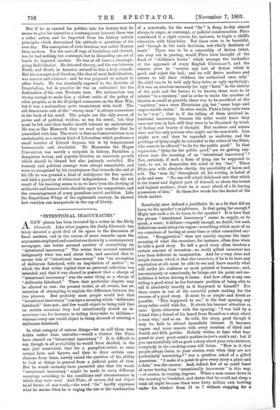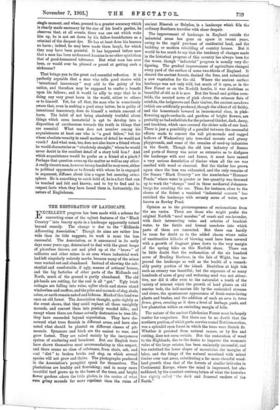"INTENTIONAL INACCURACIES."
A"Wphrase has been invented by a writer in the Daily Chronicle. Like other papers, the Daily Chronicle has lately devoted a good deal of its space to the discussion of fiscal matters, and in the course of some remarks upon the arguments employed and conclusions drawn by a contemporary newspaper, one writer accused another of committing an "intentional inaccuracy." The writer thus accused resented indignantly what was said about him, and asserted that to accuse him of "intentional inaccuracy" was "an accusation of deliberate falsehood, with an imputation of motive " ; to which the first writer replied that no personal reflection was intended, and that it was absurd to pretend that a charge of "intentional inaccuracy" was the same thing as a charge of "deliberate falsehood." There that particular dispute may be allowed to rest; the present writer, at all events, has no intention of attempting to explain the difference between the two phrases. But probably most people would feel that "intentional inaccuracy" conveys a meaning which "deliberate falsehood" does not; and few would object to being told that on certain occasions they had intentionally stated an in- accuracy—as, for instance, in telling fairy-tales to children— whereas every one would object to being accused of uttering a deliberate falsehood.
In what category of untrue things—let us call them non- truths rather than untruths—would a thinker like Plato have classed an "intentional inaccuracy" ? It is difficult to say, though in all probability he would have decided, in the case just mentioned, that for a pamphlet-writer to state certain facts and figures, and then to draw certain con- clusions from them, merely raised the question of his ability to look at things in general from a judicial point of view. But he would certainly have perceived also that the words "intentional inaccuracy" might be made to carry different meanings according to the conditions and circumstances in which they were used. And Plato, of course, did not object to all forms of non-truth,—the word " lie " hardly expresses what he means when he is urging the use or the condonation
of a non-truth, for the word "lie" is flung to-day almost always in anger, or contempt, or judicial condemnation. Plato
considered it a right course, for instance, to begin a child's education with fairy-tales. But these were to be beautiful, and "though in the main fictitious, not wholly destitute of truth." There was to be a censorship of fiction (what, one may ask in passing, would Plato have thought of the flood of "children's books" which swamps the bookseller
at the approach of every English Christmas ?), and the censors were to "receive any tale of fiction which is good, and reject the bad; and we will desire mothers and nurses to tell their children the authorised ones only." No child was to be told ugly fairy-tales, or ugly mythology; if it was an absolute necessity for ugly " facts " in the history of the gods and the heroes to be known, these were to be related "in a mystery," and in order to make the number of hearers as small as possible, there was to be sacrificed at the "mystery," not a mere Eleusinian pig, but "some huge and unprocurable victim." In other words, Plato's fairy-tales were to be "true"; that is, if the telling of them involved in- tentional inaccuracy, because the teller would know they were not true in fact, still they were to be illumined by truth of feeling and beauty of thought. But mothers and nurses were not the only persons who might use the non-truth. Lies might now and then be regarded as medicine, and the privilege of lying might be extended to the rulers of the State, who were to be allowed " to lie for the public good." In that expression, "lying for the public good," are we getting any- where near the meaning of an "intentional inaccuracy"? Not, certainly, if such a form of lying can be supposed to hurt, to rot, to demoralise the mind of the "liar." There Plato saw, with absolute clarity, the possibility of harm and evil. The "true lie," throughout all his writing, is hated of gods and men. "No one will admit falsehood into that which is the truest and highest part of himself, or about the truest and highest matters; there he is most afraid of a lie having possession of him." In those few words lies the kernel of the whole matter.
Somebody once defined a justifiable lie as a lie that did no harm to the speaker's neighbours. Is that going far enough ? Might not such a lie do harm to the speaker? It is here that the phrase "intentional inaccuracy" seems to supply, so to speak, a want; it defines—vaguely enough, no doubt, but such definitions must always be vague—something which most of us are conscious of having at some time or other committed our- selves. "Exaggeration" does not exactly express the inner meaning of what the raconteur, for instance, often does when he tells a good story. To tell a good story often involves a certain amount of invention : no really gifted raconteur has ever been deficient in imagination. And for a very clear and simple reason, which is that the raconteur, if he is to have any reputation at all, must be able to see and know exactly what will strike his audience as most pointed or humorous; and, unconsciously or consciously, he brings out his point and em- bellishes it before driving it home. And how often is any one telling a good story in the fortunate position of being able to tell it absolutely exactly as it happened to himself? For there comes in one of the essential points making for the success of a good story. It must be as simple and direct as possible. "This happened to me," is the best opening any story-teller could wish for. It rivets his hearers' attention at once. Quite otherwise with the opening : "I was told by a friend that a friend of his beard from So-and-so a story about a man who," and so on. So told, the story, good though it may be, fails to attract immediate interest. It becomes vaguer and more remote with every mention of third and fourth and fifth parties. Nobody wishes to hear what hap- pened to your great-aunt's mother-in-law's cook's cat; but if you can truthfully tell as good a story about your own retriever, everybody in the smoking-room will listen. "How is it that people always listen to your stories, even when they are not particularly interesting ?'.1 was a question asked of a gifted American. "I make it a point to give every story a place and a date," was the answer. And, indeed, few of us could boast of never having been "intentionally inaccurate" in this way, —of course, in varying degrees. When a man comes down in the morning to breakfast, and states that he could not sleep a wink all night because there were forty million cats howling under his window from 11 to 7 without stopping for a
single moment, and when, pressed to a greater accuracy which is clearly made necessary by the size of his host's garden, he observes that, at all events, there was one cat which woke him up, he is not set down by his fellow-breakfasters as a criminal of the deepest dye. He has at least done his hearers no harm ; indeed, he may have made them laugh, for which they may have been gratefuL It has happened before now that a man has been nicknamed Ananias in no other spirit than that of good-humoured tolerance. But what man has ever been, or would ever be, pleased or proud at getting such a nickname P That brings you to the great and essential reflection. It is perfectly arguable that a man who tells good stories with intentional inaccuracy" may add to the gaiety of his nation, and therefore may be supposed to confer a benefit upon his fellows; and it would be silly to urge that he is doing any very great harm in the world, either to others or to himself. Yet, for all that, the man who is consciously aware that, even in making a good story better, he is guilty of intentional inaccuracy, does do himself a certain amount of harm. The habit of not being absolutely truthful about things which seem immaterial is apt to develop into a disposition of carelessness towards the truth in things that are essential. What man does not number among his acquaintances at least one who is "a good fellow," but for whose absolute veracity in small matters of detail he would not vouch P And what man, too, does not also know a friend whom he would characterise as "absolutely straight," whom he would never doubt in the smallest detail of a story told him P And which acquaintance would he prefer as a friend at a pinch P Perhaps that question sums up the matter as well as any other. A really sincere man, however wrong-headed he may seem, either to political opponents or to friends with whom he is engaged in' argument, diffuses about him a vague but assuring atma- sphere. He is something to catch hold of, he is a fact that can be touched and felt and known; and to try to find and to respect facts when they have found them is, fortunately, the nature of Englishmen.































































 Previous page
Previous page